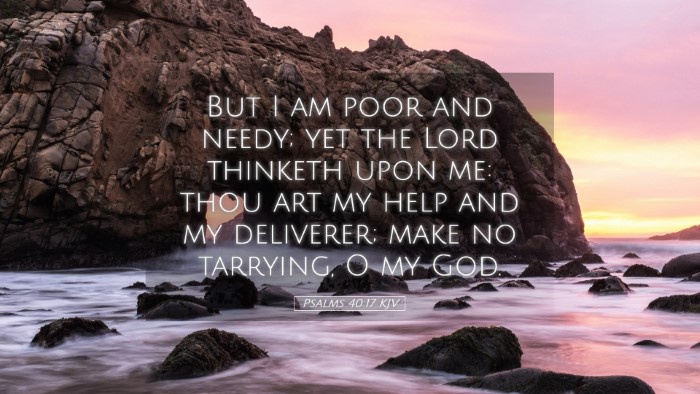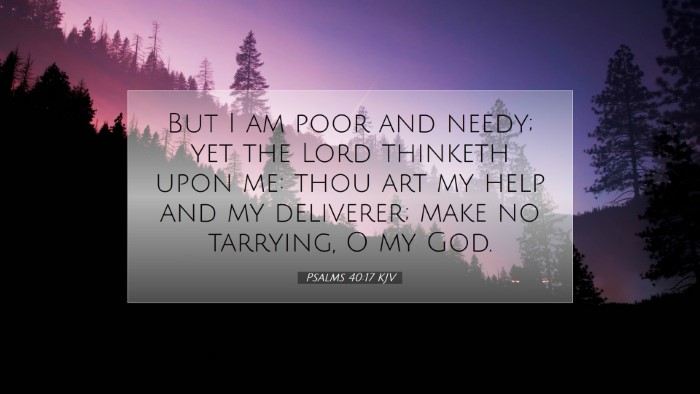Psalms 40:17 - Bible Commentary
"But I am poor and needy; yet the Lord thinks upon me: thou art my help and my deliverer; make no tarrying, O my God."
Introduction
Psalms 40:17 encapsulates a profound expression of humility and reliance on God. This verse speaks to the dichotomy of human neediness and divine support. Drawing from several public domain commentaries, we explore the depth of this verse and its implications for theology, pastoral care, and personal reflection.
Contextual Analysis
The Psalmist, traditionally attributed to David, finds himself in a posture of desperation and humility, a common theme throughout the Psalms. This expression of being "poor and needy" reflects a spiritual and physical state of reliance on God. Matthew Henry implies that this acknowledgment is foundational for approaching God in prayer.
Divine Engagement
The second part of the verse, "yet the Lord thinks upon me," presents a beautiful contrast. Albert Barnes highlights that God's awareness and consideration of the needy reflects His grace and mercy. The notion that God is mindful of humanity, especially those in want, emphasizes the relational aspect of the divine. Theologians often reflect on this divine intimacy as central to understanding God's nature.
Theological Insights
This Psalm serves multiple theological themes including:
- God's Omniscience: The acknowledgment that God is aware of individual needs reinforces the doctrine of God's omniscience.
- Human Humility: The appeals of the Psalmist remind us of the necessity of humility in our approach to God, as observed by Adam Clarke. Our expectations must be rooted in our awareness of divine grace.
- The Nature of Deliverance: The appeal for help and deliverance indicates a call for divine intervention in life's crises, resonating with the power and promises found throughout Scripture.
Pastoral Applications
For pastors and church leaders, Psalms 40:17 provides rich pastoral implications. The acknowledgment of poverty and need challenges congregants to confront their vulnerabilities and encourages openness to divine assistance.
1. Encouragement to the Afflicted: This verse can serve as a source of comfort for those who feel abandoned or burdened, underpinning the truth that God considers their plight.
2. Prayer Life Framework: The integration of need in prayer is paramount. Practicing what the Psalmist models—acknowledging one's need for help—fosters a deeper relationship with God.
3. Compassionate Outreach: Pastors can model God’s concern by urging congregants to consider the needy among them, translating the verse into actionable love for the marginalized.
Spiritual Reflection
Beyond the communal implications, Psalms 40:17 calls for personal introspection. It urges individuals to consider their dependency on God, thereby deepening faith. Clarke notes that awareness of one’s spiritual poverty can lead to genuine faith and reliance on God’s providence.
Personal Application
Believers are invited to reflect on their own lives:
- Self-Examination: In what areas do you recognize your own need for God’s deliverance?
- Trust in Divine Providence: Do you affirm that the Lord cares about your specific circumstances?
- Actionable Faith: Are you prepared to act on the knowledge of God’s care and engage in society’s needs, similar to how God engages with the needy?
Conclusion
Psalms 40:17 serves as a poignant reminder that God remains intimately aware of our needs, encouraging us to express our vulnerability in faith. The combination of human poverty and divine attention invites deeper trust, accountability, and compassion within the faith community. The commentaries of Henry, Barnes, and Clarke unite to provide a holistic understanding, reminding readers that God’s help and deliverance are ever-present for those who earnestly seek Him.


